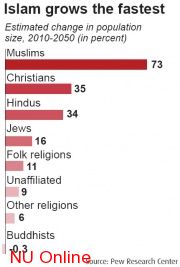Jakarta, NU Online
A new survey by the Pew Research Center has predicted that Islam will become the fastest growing religion in the world over the next four decades because of religious switching, increasing fertility rates and the size of the youth population in a number of Muslim countries including Indonesia, which has the largest Muslim population.<>
According to the latest survey conducted in 2010, Christianity was the largest religion with 2.2 billion followers out of the 6.9 billion world population, followed by Islam with 1.6 billion adherents, who account for 23 percent of the global population.
With the world’s total population expected to rise to 9.3 billion between 2010 and 2050, Muslims, a comparatively youthful population with a high fertility rate, are projected to reach 2.8 billion — a 73 percent increase — trailing a little behind the Christians’ 31 percent rise to 2.9 billion by 2050.
In terms of fertility rates, Muslims are currently at an average of 3.1 children per woman — well above the 2.1 rate typically needed to maintain a stable population — followed by Christians at 2.7 children per woman, Hindus at 2.4 and Jews at 2.3 children per woman.
The Pew Research Center says that in 2010 as much as 27 percent of the world population was under the age of 15, while in the same year Muslims and Hindus were, respectively, 34 percent and 30 percent under 15. Meanwhile, the proportion of under-15 Christians matched the global average of 27 percent.
Other interesting findings of the study were that Hindu-majority India is projected to have the world’s largest Muslim population by 2050, surpassing Indonesia, while in Europe, Muslims will make up 10 percent of the overall population.
Commenting on the study, Ahmad Fuad Fanani of the Maarif Institute for Culture and Humanity, which campaigns for religious pluralism in this country, said on Sunday that Indonesia’s future bulging Muslim youth numbers as predicted by the survey were prone to radical Islamic propaganda imported from overseas through social media, which now can be accessed by anyone in the country.
According to a study conducted by Maarif between 2011 and 2012, radical propaganda was promoted through extracurricular activities at schools and universities that lacked supervision by teachers and lecturers.
“Lack of extracurricular activities at schools will be used by the radical groups to spread radical ideology to students in the future. We used to have internal school organizations like OSIS and Pramuka, but they are no longer as active as in the past,” Fuad said.
To get sympathy from young Indonesian Muslims, he said, the radical groups labelled the politically motivated war in the Middle East a war between Islam and the West, which hates Muslims.
The former commander of the Jamaah Islamiyah, Abdul Rahman Ayyub, who was once sent by the group to fight along with radical groups in Afghanistan, urged the government to update religious books at schools for young Indonesians to better know the true meaning of jihad and other religious terms used by radical groups to spread their ideology in Indonesia.
“What the school books now have is not enough to counter all the information that the youth could get themselves on the Internet. We need more up-to-date books for them to understand Islam better, to take them away from destructive radical propaganda,” Abdul said.
He further said that the government should make use of former jihadists like him to launch campaigns from school to school and university to university to spread a positive image of Islam, which campaigns for peace.
Editing by Sudarto Murtaufiq
Terpopuler
1
Gerhana Bulan Total Bakal Terlihat di Seluruh Indonesia pada Selasa 3 Maret 2026, Dianjurkan Shalat Khusuf
2
Panduan Shalat Gerhana Bulan Petang Ini, Mulai Niat hingga Salam
3
PBNU Instruksikan Qunut Nazilah Respons Agresi Israel-AS ke Iran
4
Gus Yahya Sebut Kepergian Ketum Fatayat Margaret adalah Kehilangan Besar bagi Keluarga NU
5
Ali Khamenei Wafat dalam Serangan Israel-Amerika
6
Innalillahi, Ketum Fatayat NU Margaret Aliyatul Maimunah Wafat
Terkini
Lihat Semua
















